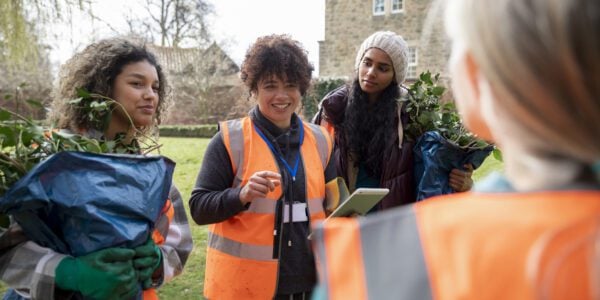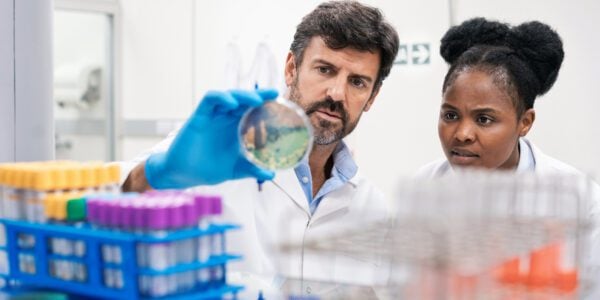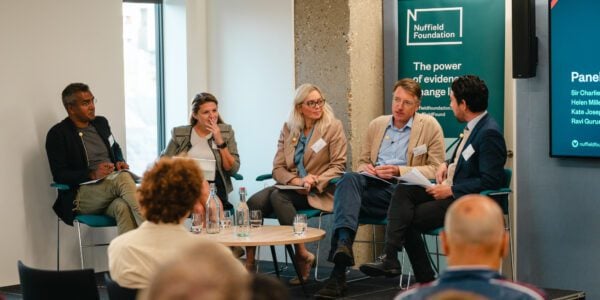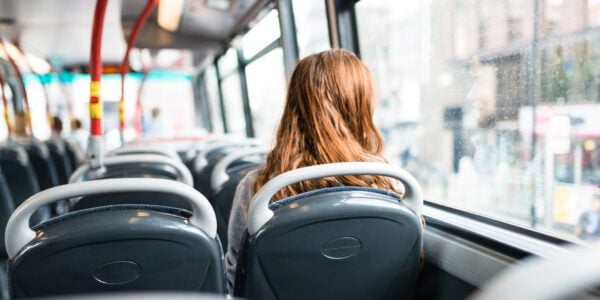
22/02/21
4 min read
The devastating impact of the COVID-19 pandemic on the UK was exacerbated by fault lines in the welfare state and public services that developed in the previous five years, according to a major new report from the London School of Economics and Political Science and funded by the Nuffield Foundation.
A wide-ranging programme of research, co-led by Dr Polly Vizard and the late Sir John Hills CBE, has identified the key areas of concern, as well as insights about what is required as Britain transitions into the recovery phase from the pandemic. Its message is clear: social disinvestment is inefficient and carries a heavy price.
The research covered ten major areas of social policy: social security, employment, early years, education, higher education, health, adult social care, homelessness and complex needs, physical safety and security, and social mobility. It identifies the major weaknesses and structural limitations of the welfare state and public services on the eve of the pandemic, and assesses the pre-existing patterns in trends in social inequalities that existed in early 2020.
The five key findings are:
- Employment reached a sustained high level and participation in higher education was also historically high, but the protective capacity of the welfare state was eroded in multiple ways, especially in relation to working age adults and families.
- The public spending deficit was reduced but resource, workforce and capacity pressures built up across multiple public services simultaneously, resulting in a failure to meet current needs, compromising quality, and eroding the resilience of public service to shocks.
- The welfare state and public services continued to adapt to the rising and different needs and circumstances of the 21st century, but not fully. For example, Universal Credit being digitalised proved to be an important advantage when the pandemic struck. The NHS stands out internationally as being highly equitable, while increased focus on integrated care and mental health were important policy advances. But unmet need for social care in England was high on the eve of the pandemic.
- While there was more emphasis on skills in the context of the post-Brexit agenda, social investment from childhood years through to adult training continued to be given insufficient priority.
- Looking across ten areas of social policy on the eve of the COVID-19 pandemic, there was mounting evidence of a slowdown in social progress and a widening of deep structural inequalities across multiple dimensions of life.
The eight aspects of stalling social progress are:
- Progress in reducing poverty had stalled in the UK. The number of children in relative poverty rose to 4.2 million in 2018/19, and rates of poverty among children in families with three or more children increased sharply from 2013/14 onwards.
- The overall employment rate in the UK increased from 72.4% in 2014 to 76.6% in 2019, minimum wages increased and the proportion of 21 to 30-year-old graduates in high skilled employment went up, reversing a previous negative trend. However, in-work poverty rates also increased – nearly two million full-time employees were living in poverty by 2017/18 – and the number of young people not in education, employment or training had stopped falling by 2017.
- Developmental gaps between disadvantaged reception-age children and others in England stopped improving in 2017 and then widened again. A higher proportion of babies born into low socio-economic status families in England and Wales have a low birthweight, and the gap increased in 2018, reversing a previous narrowing. The infant mortality rate in the UK increased for three consecutive years to 2017, an unusual development in historical perspective.
- Although higher education participation in England increased and disadvantage gaps decreased, improvements in progress in education at age sixteen stalled and on some indicators, gaps were increasing. New apprenticeship starts for under 19s fell by one-third between 2015/16 and 2019/20. The proportion of young people achieving Level 2 at age 19 had fallen – with a worsening in the position for students eligible for free school meals, from disadvantaged areas and for those with special education needs. Exclusions (including permanent exclusions) were also on the increase prior to the pandemic and this was disproportionately affecting more disadvantaged groups.
- Adverse mortality trends pre-dated the pandemic with episodes of high excess mortality and a slowdown in improvements in population life expectancy during the second decade of the 21st century. The slowdown in improvements in life expectancy in England during the second decade of the 21st century affected men and women across deprivation groups but was particularly marked for women living in the most deprived tenth of local areas – for whom life expectancy declined between 2011-13 and 2016-18.
- High levels of unmet need for adult social care in England on the eve of the pandemic affected the most disadvantaged disproportionately. Two out of five older people in the most deprived areas did not receive the help they needed with meeting their daily needs in 2018. The burden on unpaid carers, already high in the UK by international comparison, increased: by 2018/19, one in three was providing 35 hours a week or more.
- After a long period of improvements, data from the Crime Survey for England and Wales shows that there have been no significant reductions in the number of violent incidents since 2015. The period also witnessed increases in knife crime, gun crime and homicides. Domestic homicide was on an upward trend prior to the pandemic and reached a five year high in the latest data (2019) – with the vast majority of victims being women.
- In England core homelessness rose steadily up to 2017, with particular growth in rough sleeping and unsuitable temporary accommodation. There were indications of an improvement on some measures after 2017, although rates remained high on the eve of the pandemic.
Five challenges for social policy looking forward are:
- Sustainable funding models as a foundation for a welfare state and public services that are fit-for-purpose for the 2020s.
- Strengthening accountability for improving social outcomes and reducing social inequalities.
- Developing multi-dimensional strategies and interventions that join-up different social policy areas and extend across multiple life domains.
- Giving first priority to the needs of the most disadvantaged and to comprehensive public action to reduce social inequalities.
- A new values-based approach to social policy: dignity and respect, recognition and social value.
The government’s desire to “level-up” is often discussed in terms of narrowing the gap in economic performance between London and the South East on the one hand, and the rest of the UK on the other. But where people live is only part of the picture – there are huge variations in opportunity, wealth, and well-being across many other dimensions, such as ethnicity, social background, age, gender and disability, many of which intersect and reinforce each other. This report provides a unique analysis of the major weaknesses and structural limitations of the welfare state and public services that existed even before the pandemic and illustrates both the scale and urgency of the action required to build a society that provides a good quality of life for all, including those people and groups who are currently facing the greatest deprivation.Mark Franks, Director of Welfare, Nuffield Foundation
It is critical that the lessons from the second decade of the twenty first century are not obscured by the enormity of the pandemic itself and that action is taken to address the social policy lessons from the pre-pandemic period. The programme findings identify serious weaknesses and limitations of the welfare state and public services on the eve of COVID-19. There is overwhelming evidence that a break in progress in improving social outcomes and reducing social inequalities across multiple critical areas of life had already occurred prior to the public health emergency and the economic and social shocks that it triggered. Across the social policy areas that we examined, key indicators of social progress had already slowed down, stalled or gone into reverse prior to the onset of the COVID-19 pandemic.Dr Polly Vizard
Download report
-
Summary Report: The Conservative Governments’ Record on Social Policy from May 2015 to pre-COVID 2020: Policies, spending and outcomes2MB | pdf | 22 February 21
-
Full Report: The Conservative Governments’ Record on Social Policy from May 2015 to pre-COVID 2020: Policies, spending and outcomes5MB | pdf | 22 February 21
































